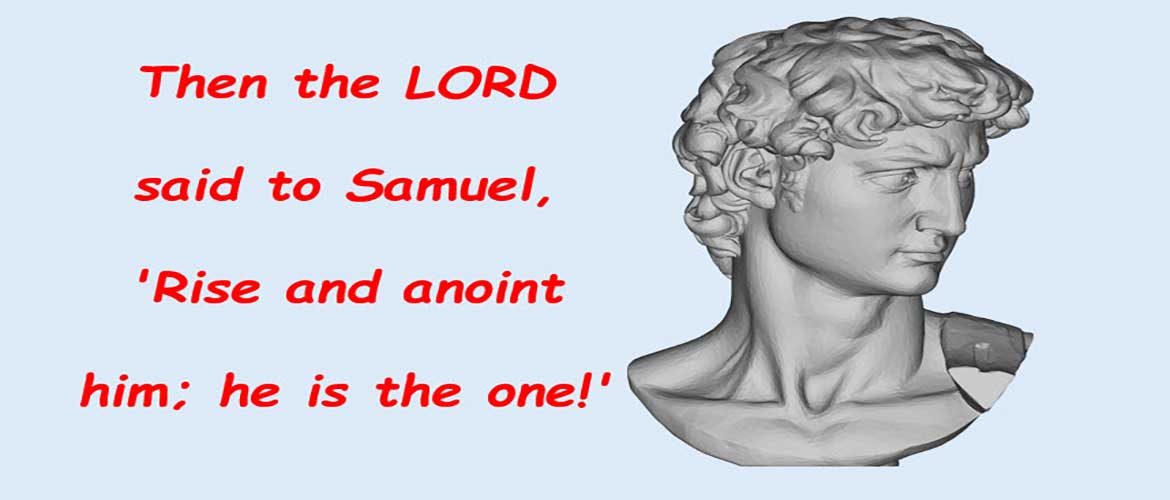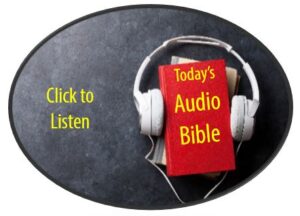
Good Monday to you my “Walking with Jesus” friends,
One year from today will be a very important day in America, do you know why? America will be inaugurating their next President one year from today! Who will be the next US President? What qualifications will he or she bring to the Oval office? What spiritual orientation will the next US President have and what influence will God have on his or her leadership?
With those questions as a backdrop, join me again today as we walk along with the old prophet of God Samuel, as he’s traveling from his home in Ramah, south beyond Jerusalem to the town of Bethlehem. Samuel is going there as he follows these very specific instructions he had received from God. “Fill your horn with oil and be on your way, I am sending you to Jesse of Bethlehem. I have chosen one of his sons to be king of Israel.” (1 Samuel 16:1)
Once before Samuel had received similar instructions from God and that time Samuel had anointed a young man named Saul to be the first human king of Israel. After only several months, Saul had turned prideful and insubordinate, refusing to follow God’s instructions. That turn of his heart disqualified Saul from serving as a God anointed king of Israel. Oh, Saul would retain the title and responsibility as king of Israel, but he no longer had God’s anointing, God’s guidance, God’s protection, God’s blessing or God’s provision. He was totally left to fend for himself as a human leader without any formal training to be King. Saul floundered making many very poor decisions as king.
But God had NOT abandoned His people and Samuel, with his rams horn and a flask of anointing oil, was walking toward Bethlehem. Now of course you and I, when we hear the name Bethlehem, suddenly we think of many wonderful Biblical stories about this little town, the most significant, of course, being the birthplace of Jesus. But for Samuel, we can safely assume Bethlehem was a little town with no significance.
Only two things are recorded in the Bible that had happened before Samuel in or near Bethlehem. Jacob’s dear wife Rachel had died giving birth to her son Benjamin, and her body was buried along the road near Bethlehem, (Genesis 35:19) but my friends that was almost 900 years before Samuel’s visit to Bethlehem! The other event is of course the wonderful story of Naomi and Ruth, Boaz and their son Obed. (Ruth)
While we don’t know if Samuel knew their story, I think it’s safe to assume, as Samuel came to Bethlehem that day, Obed was very likely still alive and living in Bethlehem, for he was Jesse’s father and the grandfather of Jesse’s sons.

Samuel was famous as the long-time spiritual leader of Israel and therefore whenever Samuel showed up in any town people quickly wondered why!? In fact, the record says: “Samuel did what the LORD said and when he arrived at Bethlehem the elders of the town trembled when they met him. They asked, ‘Do you come in peace’?” (1 Samuel 16:4) Samuel was quick to calm them and assure them that he had come in peace. He made no mention of God’s instructions to him about anointing a king in Bethlehem, but Samuel made a point to invite Jesse and his family to the time of worship he’d be leading. We don’t know if others came, but we do know that when Jesse showed up with 7 big strong sons, Samuel was impressed and probably excited to see which of these men God would select to be king.
The record says: “When they [Jesse’s sons] arrived, Samuel saw Eliab and thought, ‘Surely the LORD’s anointed stands here before the LORD.’ But the LORD God said to Samuel, ‘Do not consider his appearance or his height for I have rejected him. The LORD does not look at the things man looks at. Man looks at the outward appearance, but the LORD looks at the heart.” (1 Samuel 16:6,7) Oh my! Now friends, let’s not assume this means Eliab had a wicked heart. The phrase “I have rejected him” for Eliab does not mean the same as when God said He had rejected Saul. Probably a better translation would be “I have not selected him”. God was seeking a special type of trustworthy, humble, God honoring leader, not just any ordinary man.
Did you notice God’s clarifying statement? “The LORD does not look at the things man looks at. Man looks at the outward appearance, but the LORD looks at the heart.” Once before when selecting a king God had chosen a big, strong, handsome man because God knew the leaders of Israel wanted that type of impressive leader. This time God is making a clear distinction that the condition of the heart would be God’s primary criteria for selecting Israel’s next king. But do you notice friends, for God this does not only apply to leadership selection, this applies to EVERY person? The condition of our heart before God is far more important than our physical appearance or our achievements in life, have you and I learned that and are we living our lives with confidence that God knows our heart?

I presume Jesse was feeling very honored to introduce his sons to the famous, old prophet of God Samuel, so he likely did it in birth order, with the eldest, his first born, Eliab having the first privilege. Jesse then called his next son Abinadab and introduced him to Samuel. Can you see Abinadab bowing in reverence before Samuel and them talking for a moment, while Samuel listened very carefully to the Holy Spirit waiting for some word from God? After a moment or two, Samuel heard these words in his spirit: “The LORD has not chosen this one either.” Next came Jesse’s third born, Shammah but the Holy Spirit spoke the same words into Samuel’s spirit.
Finally, Samuel had met all the sons of Jesse, who’d come with their father Jesse, and Samuel was confused. He knew he’d heard the LORD give him very specific instructions that he would anoint one of Jesse’s sons, yet God had not selected any of them. So, Samuel of course had a question for Jesse: “Are these all the sons you have?’ Jesse answered, ‘There is still the youngest, but he is tending the sheep.’ Samuel replied, ‘send for him, we will not sit down until he arrives.” (1 Samuel 16:8-11)
I’ve often wondered if Obed, grandfather to all these boys, was with them that day, just watching very carefully all that was taking place? If he was there, was Obed thinking about the miracle story of his mother Ruth the Moabitess married to his father Boaz, the kinsman redeemer of Noami? If Obed was there, did he have any understanding of what Samuel was doing in Bethlehem and why he wanted to meet all Jesse’s sons?
Finally, the youngest of Jesse’s boys arrived. The record says it like this: “He was ruddy, with a fine appearance and handsome features. Then the LORD said to Samuel, ‘Rise and anoint him; he is the one!’ (1 Samuel 16:12) How did Jesse introduce the boy, David? How did young David appear to Samuel, perhaps still a boy of maybe 10 or 12 years of age? Can you see old Samuel rising up off the stool where he sat waiting, perhaps wiping the tears from his eyes, then embracing the boy David as Jesse introduced him.
Perhaps it was then that Samuel explained the God given purpose of his trip. The record says: “So Samuel took the horn of oil and anointed him in the presence of his brothers, and from that day on the Spirit of the LORD came upon David in power.” (1 Samuel 16:13) We have no record of what Samuel said or how Jesse or any of his sons responded to this. We do NOT know if Obed, grandfather to these boys, was present. But this was a sacred, defining moment in the history of Israel.
Now let’s be careful to understand something significant here my friends: Saul was still the God selected; Samuel anointed King over all Israel. While God had withdrawn His Holy Spirit and His blessing from Saul, Saul was to be King until his death. The anointing of David was to a future kingship. By this act Samuel was telling Jesse’s family and specifically David, that David was God’s choice to be King over Israel AFTER Saul ended his years of service.
Until then, this anointing was a private matter for their family. Jesse and his other sons now had responsibility to teach and train David in everything they knew and especially in the ways of God, so that when the time would finally come, David would be ready to serve God as King over Israel. David had a responsibility to keep himself pure before God and focus on learning all he could about the God of his ancestors and building his relationship with God. Samuel did not call David away from his family, but rather David remained in his same role as the youngest boy doing the chores assigned by his father and Samuel returned to his home in Ramah, all of them awaiting the day God would give them further instructions.
Let’s pause here, witnessing this remarkable scene as Samuel anoints and prays over young David to be the future king of Israel. Here in this defining moment David is surrounded by his father Jesse, his brothers and perhaps his grandfather Obed. Later that day, Samuel is beginning his walk back to Ramah and David has gone back out to watch the sheep, and God is working in the hearts of both men as God prepares for the future of His people Israel. I wonder what God is doing today in your life, your community as He prepares for the future HE sees where you live. Here’s a song to help us consider this…
Bible images provided with attribution to www.LumoProject.com.
Have a comment or question about today’s chapter? I’m ready to hear from you, contact me here.

Pastor Doug Anderson
“Let us run with perseverance the race marked out for us, with our eyes fixed on Jesus…” (Heb. 12:1,2)
Archived back issues of “Walking with Jesus” and other resources are available by clicking here to open our ‘home page’ (or go to HOME at upper right of this page).
Share with friends. Subscribe below for daily “Walking with Jesus”.


